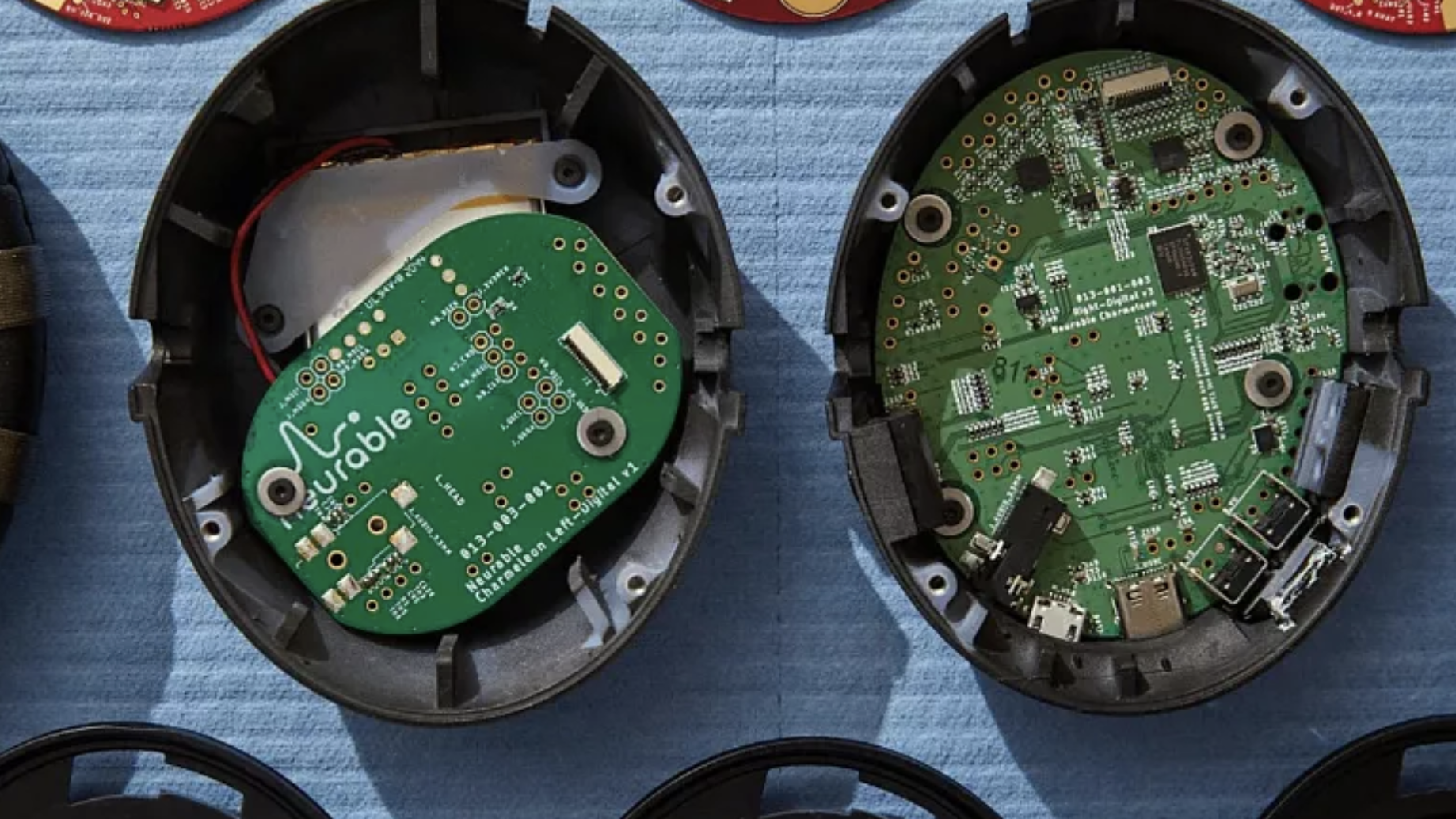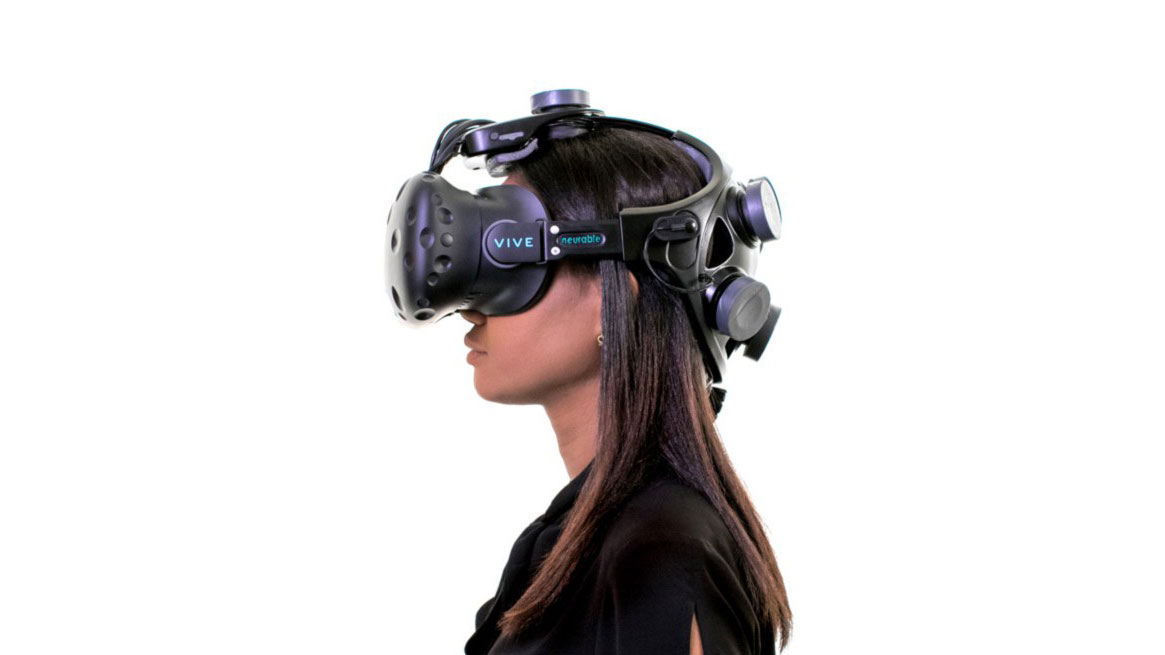These neurohacking AI headphones can track your brain waves to help you focus
Yep, brain-hacking headphones are a thing now

Just when you think you've exhausted the current capabilities of ChatGPT, spent a day hearing what Spotify's AI DJ makes of your music, marvelled over Google's ability to auto-generate polite (or less polite) emails and even heard about the five ways the 'Godfather of AI' thinks artificial intelligence could ruin everything, someone releases a set of over-ear headphones that can read your mind.
To clarify, the new Neurable headphones (for that is the name of the company behind the cans) use 'neurohacking' AI to track your brain signals and thus help you stay productive.
How can headphones help you level up your thinking gear? Either by telling you to take a break because your wits are flagging (like that 'battery low' missive you currently get, but for your own noggin) or by swapping the track you're listening to with something more conducive to mental focus.
As reported by Euronews, Dr Ramses Alcaide, CEO of Neurable, spoke at this year's VivaTech in Paris (an annual technology conference dedicated to innovation and startups) to explain that Neurable is developing headphones that can track brain signals, detecting when the wearer is in a state of deep focus, or when their focus is slipping. But don't be fooled, Neurable isn't a newbie in the brain-computer interfaces game; the firm's been working with your brain waves for years – on a VR headset in 2017 for starters.
"These headphones here have silver bands that are actually electrodes, and they look like soft cloth," he told Euronews Next. "They record brain activity from around your ear area. And then using our AI, we're able to boost that signal so that we can pick up a lot of the core of responses across your brain," he added.
So how do they 'neurohack' though, exactly? Because the frontal lobe of the brain is an area associated with focus, the headphones are able to detect relevant signals that Neurable’s artificial intelligence programme is able to amplify.
Opinion: health, focus and happiness is one side of the coin, but should we worry about brain-hacking cans?

The claimed (and noble) idea behind the headphones is to give people better knowledge of their own state of mental fatigue and thus help them avoid burnout – or (sigh) maybe just grab another coffee if they've got deadlines to meet.
Get daily insight, inspiration and deals in your inbox
Sign up for breaking news, reviews, opinion, top tech deals, and more.
One might argue that in the wrong hands – if bosses acquired that data from employees and subsequently disciplined staff who took more breaks than others, say – the tech could be both damaging and discriminatory. Alcaide would disagree: "I've worked with a lot of governmental groups when it comes to regulation for brain computer interfaces and it's a lot of it is fear mongering," he said.
Alcaide also mentioned that data collected from Neurable's work suggests that taking a quick five-minute break at a key moment will actually increase your focus for the next four hours.
"We actually just did a study at the Mayo Clinic where we saw that if you're able to take breaks at the right time, we were able to reduce end of day stress by 20 per cent and increase end of day happiness by 70 per cent," he said.
Apparently, the headphones simply play a small announcement through your ear like, 'Hey, it's time to take a break,' which of course you can ignore it if you want to, depending on where you are with your work task.
Neurable's cans are an example of a non-intrusive type of brain-computer interface (BCI) – unlike Elon Musk's Neuralink brain chip, a surgically-implanted device which is much more powerful and (hopefully) intended for recovery from traumatic brain and spinal cord injuries.
The power here is supplemented by AI and machine learning, but Alcaide is adamant that its implementation in headphones can sufficiently boost brain signals.
"With our current system we can do things like changing tracks when you're listening to music, as well as using it to understand cognitive health," he said.
Is it all pie in the sky thinking though? Not at all. Neurable’s technology is reportedly being used by a major headphone brand, ahead of a product launch later this year. Which one? Alcaide wasn't able to say, but did say the product would be a headphone version of the Apple Watch, enabling users to track their cognitive health.
So, some of the best over-ear headphones might soon be able to hack into your brain, OK? Good. Watch this space.

Becky became Audio Editor at TechRadar in 2024, but joined the team in 2022 as Senior Staff Writer, focusing on all things hi-fi. Before this, she spent three years at What Hi-Fi? testing and reviewing everything from wallet-friendly wireless earbuds to huge high-end sound systems. Prior to gaining her MA in Journalism in 2018, Becky freelanced as an arts critic alongside a 22-year career as a professional dancer and aerialist – any love of dance starts with a love of music. Becky has previously contributed to Stuff, FourFourTwo and The Stage. When not writing, she can still be found throwing shapes in a dance studio, these days with varying degrees of success.